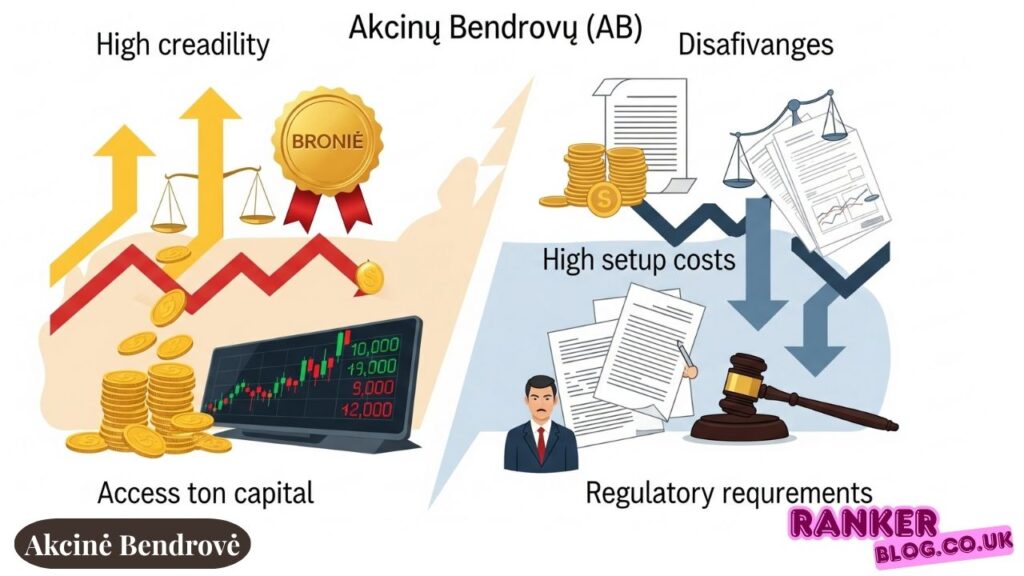What in the world does the term “Akcinė Bendrovė” mean, you ask yourself after hearing it? You’re not alone, so don’t worry! A joint-stock corporation, a corporate form that permits investment through shareholding, is referred to by this Lithuanian phrase. Knowing this word is crucial whether you intend to grow your company into Lithuania or are just inquisitive.
In the Lithuanian and EU markets, an akcine bendrove (AB) might be the ideal business model for scalability, credibility, and profitability. Many entrepreneurs, including those working with professional services like Akcine Bendrove Hanner (AB formation specialists), recognize the potential of this business structure. Let’s examine the specifics.
Understanding the Concept
Definition of Akcinė Bendrovė (AB)
In Lithuania, an akcine bendrove, sometimes known as AB, is a joint-stock business. Shareholders can purchase or sell the capital that has been divided into shares by this legitimate business entity. To put it another way, it’s similar to a company that has been divided into manageable chunks for investors.
When discussing akcine bendrove angliskai, the English translation is “joint-stock company” or “public limited company.” This business structure has become increasingly popular among entrepreneurs seeking to establish substantial operations in Lithuania, with companies like uzdaroji akcine bendrove CV Group providing specialized consulting services for business formation.
Difference Between AB and Other Business Entities
Unlike small private companies (UABs), ABs are often larger and more public-facing. While a uzdaroji akcine bendrove (UAB) is a closed company, an AB can be publicly listed, opening the doors to public investment. The uzdarosios akcines bendroves steigimas (formation of closed joint-stock companies) follows different procedures and requirements compared to public ABs, requiring specialized knowledge and expertise.
Legal Foundation in Lithuania

ABs are governed by the Lithuanian Civil Code and Law on Companies, which ensure transparency, protect shareholders, and standardize business operations. This legal framework provides the foundation for all joint-stock companies operating within the Lithuanian jurisdiction.
Types of Akcinė Bendrovė

Public Akcinė Bendrovė
This type allows shares to be traded on the stock exchange, making it a great choice for large-scale operations. Public ABs must meet stricter disclosure requirements and follow enhanced governance standards.
Private Akcinė Bendrovė (UAB)
Not to be confused with AB, a UAB is a private joint-stock company. It’s ideal for startups or small-to-medium businesses. The uzdaroji akcine bendrove structure provides more privacy and flexibility for smaller operations.
Key Features of an Akcinė Bendrovė
Shareholder Structure
ABs can have one or more shareholders, and ownership is proportional to the number of shares held. This structure allows for flexible ownership arrangements and easy transfer of ownership interests.
Capital Requirements
The minimum share capital to start an AB is €40,000—a sign that it’s built for serious business. This substantial capital requirement ensures that only committed entrepreneurs pursue this business structure.
Transparency and Reporting Duties
Annual reports, shareholder meetings, and audit compliance are mandatory, ensuring transparency and investor trust. These requirements help maintain public confidence in the joint-stock company system.
Liability and Risk
Shareholders are only liable up to the amount of their investment. So, no worries about losing your house if things go south! This limited liability protection makes the AB structure attractive for investors.
Formation Process
Requirements to Start an AB
To get started, you’ll need:
- A unique company name
- Shareholders
- Minimum capital
- Articles of Association
Registration Process Step-by-Step
The formation process involves several key steps:
- Draft legal documents
- Deposit capital
- Register with the Register of Legal Entities
- Obtain a tax ID
Necessary Documents
Required documentation includes:
- Founding agreement
- Articles of Association
- Shareholder list
- Proof of capital deposit
Governance and Management

Board of Directors
The board handles high-level strategy and governance decisions. Board members have fiduciary duties to shareholders and must act in the company’s best interests.
Supervisory Board
Optional but recommended for oversight, especially in public ABs. The supervisory board provides additional checks and balances in corporate governance.
CEO Responsibilities
The CEO or Managing Director handles the day-to-day operations and reports to the board. This executive role is crucial for implementing strategic decisions and managing daily business activities.
Shareholding and Rights
Types of Shares
ABs may issue:
- Ordinary shares
- Preferred shares
Each type of share comes with different rights and privileges, allowing companies to structure their equity in various ways.
Shareholder Rights and Duties
These include voting, dividends, and access to company records. Shareholders have the right to participate in major corporate decisions and receive their proportionate share of profits.
Profit Distribution
Profits are shared proportionally to share ownership, usually as dividends. This distribution mechanism ensures that all shareholders benefit from the company’s success.
Taxation and Financial Aspects
Corporate Taxes in Lithuania
The corporate income tax rate is 15%, but incentives may apply to startups or specific sectors. Lithuania offers competitive tax rates to attract international businesses.
Dividends and Taxation
Dividends are typically taxed at 15%, but treaties can lower the rate for foreign investors. This favorable tax treatment makes Lithuanian ABs attractive for international investment.
Financial Reporting Obligations
Annual audits are mandatory for large companies, and reports must be filed with the government. These requirements ensure transparency and accountability in financial management.
Pros and Cons of Starting an Akcinė Bendrovė
Advantages
- High credibility
- Access to capital markets
- Share transferability
- Limited liability
Disadvantages
- Higher setup cost
- Regulatory requirements
- Public disclosure
Akcinė Bendrovė vs. UAB

Key Differences
FeatureABUABPublic TradingYesNoMinimum Capital€40,000€2,500Number of Shareholders1+1–249
Choosing the Right Form for Your Business
If you’re aiming big and want external investors, go with an AB. If you’re a small startup, UAB might be more practical. The choice depends on your growth plans and capital requirements.
Compliance and Regulatory Oversight
Role of Lithuanian Institutions
Key regulatory bodies include:
- Register of Legal Entities
- State Tax Inspectorate
- Bank of Lithuania (for listed companies)
Penalties for Non-Compliance
Failure to report or comply may result in fines, suspension, or dissolution. Companies must maintain strict compliance with all regulatory requirements.
Real-World Examples
Notable Akcinė Bendrovė Companies in Lithuania
- AB “Ignitis grupė” – energy
- AB “Vilniaus baldai” – furniture manufacturing
- AB “Lietuvos energija” – electricity provider
Their Success Stories
These companies have become regional powerhouses, thanks to their AB structure, which allowed them to scale and attract investors. Their success demonstrates the potential of the joint-stock company model.
International Perspective
Comparison with Joint-Stock Companies in Other Countries
- USA: Corporation (Inc.)
- Germany: Aktiengesellschaft (AG)
- France: Société Anonyme (SA)
Foreign Investment Opportunities in Lithuanian ABs
Yes, foreign nationals and companies can own shares in ABs. Lithuania is part of the EU, making it an attractive gateway to European markets.
When to Consider Forming an AB
Best Scenarios for Choosing AB
Consider forming an AB when:
- Planning an IPO
- Needing large-scale investment
- Seeking long-term credibility and structure
Long-Term Growth and Scalability
An AB is tailor-made for businesses with big ambitions and long-term growth strategies. This structure provides the flexibility and credibility needed for significant expansion.
Conclusion
An Akcine Bendrove (AB) is more than just a company type—it’s a launchpad for ambitious businesses in Lithuania. With its structured governance, access to public capital, and legal protections, it’s perfect for companies ready to go big. Whether you’re local or international, if you’re thinking about serious business in the Baltics, an AB is worth a hard look.
FAQs
What is the minimum capital required for an AB?
The minimum capital is €40,000, and it must be fully paid before registration.
Can foreigners own shares in a Lithuanian AB?
Yes! Lithuania welcomes foreign investment, and AB shares can be fully foreign-owned.
What’s the difference between an AB and a UAB?
ABs can be publicly listed and require higher capital, while UABs are private and more suited for small businesses.
How do I dissolve an Akcinė Bendrovė?
You’ll need shareholder approval, settle debts, and notify the Register of Legal Entities.
Is it necessary to list an AB on the stock exchange?
No, only public ABs need to be listed. Private ABs operate without being on the stock market.
Also Read: Protocolo Operacional Padrao: The Foundation of Organizational Excellence

